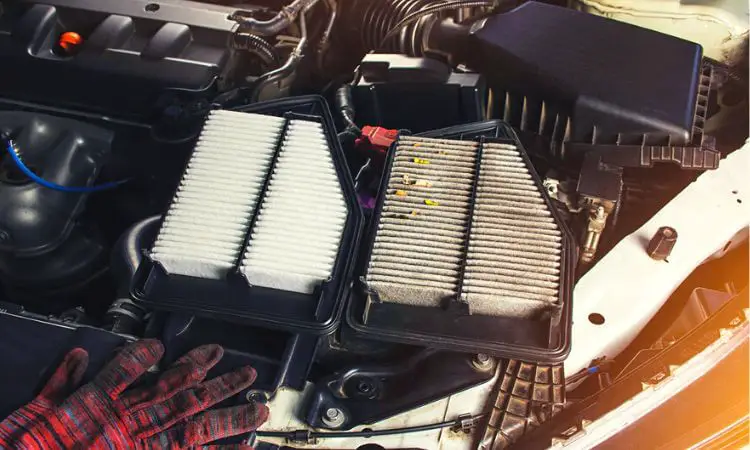Hey there! This post contains affiliate links to products. We may receive a commission for purchases made through these links. But it never influences our product selection process.
Ticking noise when accelerating can ruin your smooth driving experience on the GMC Sierra. But no worries; you can fix it without professional assistance. But do you know how to fix the GMC Sierra ticking noise when accelerating?
Low oil levels and exhaust leaks are the major reasons why you hear a ticking sound when accelerating. Refill the oil or replace or repair the exhaust pipes if needed. However, engine filter, drive belt, and valve train problems can be the reason for the ticking noise.
Stay tuned! I will help you locate the issue and then correct it appropriately.
Common Causes of Ticking Noise in GMC Sierra When Accelerating
The ticking noise when you accelerate your GMC Sierra can be due to multiple issues in your vehicle. However, here is a list of a few causes you must check before seeking professional assistance.
- Low oil
- Exhaust leak
- Bad engine lifter
- Damaged Drive Belt
- Valve Train Noise
For a better diagnosis of the ticking noise problem, also read this blog: Dodge Charger ticking noise when accelerating.
GMC Sierra Ticking Noise When Accelerating [Problems & Solutions]

Problem 1: Low Oil Level
Your GMC Sierra may produce a ticking noise when accelerating due to low oil levels. The low oil level causes low lubrication of the engine components, which may increase friction. Increased friction can produce unwanted noises; it needs immediate attention; otherwise, you may experience heavy engine repair expenses.
Solution:
Park your GMC Sierra on a level surface and let it sit for five minutes to balance the oil level in the engine.
Now, remove the oil tank dipstick and clean it. Then, reinsert it and remove it after a few seconds.
Check the oil level and ensure it is between the lower and higher points mentioned on the dipstick.
But if the oil level is low, add more oil to reach the recommended level. I recommend Valvoline Advanced Full Synthetic SAE 0W-20 Motor Oil for your GMC Sierra.
It is also better to check oil quality; if the oil is bad, remove all remaining oil and add fresh oil.
Once refilled, close the oil tank, let your vehicle idle for a few minutes, and start the engine. Take a few miles and ensure there is no ticking noise.
Read this blog if your GMC Sierra brake lights have an issue: GMC Sierra brake lights not working.
Problem 2: Exhaust Leak
An exhaust leak can be the reason for that issue on your GMC Sierra. When there is an exhaust leak, unburned gases escape and cause disruption.
You may experience a ticking noise due to premature exhaust flow. Check for the exhaust leak and repair it to cover the issue.
Solution:
- Check for the exhaust system; it starts from the start to the end of the vehicle. Park your vehicle and lift it on the jack stand. Use a dependable jack stand to raise your GMC Sierra; I suggest BIG RED AT42002R Torin Steel Car Jack Stands.
- Now, lay down the vehicle, check thoroughly the exhaust lines, and ensure there is no leak. If there is a leak, try to repair it.
- Also, check for connections and ensure they are tight. If the connections are loose, tighten them.
- Replace the parts that are damaged.
- Once done, gently accelerate your vehicle and ensure the problem is removed.
Problem 3: Bad Engine Filter
Engine filters ensure proper airflow to supply the proper fuel for combustion. If the filter is faulty, it may fail to perform its function, leading to increased stress on engine components that may generate noise.
Solution:

- Turn your GMC Sierra off and locate the air filter.
- Once located, check it and ensure it is clean; if you have replaced it a few days before, clean it and reinstall it.
- But if the filter is too dirty, replacing it with a new one is better.
- After replacement, start the engine and accelerate to ensure no ticking noise.
If your GMC Sierra blower motor is faulty, you must read this blog: GMC Sierra blower motor problems and solutions.
Problem 4: Damaged Drive Belt
The drive belt ensures proper and smooth operation of engine components. But if the drive belt is damaged, components will fail to maintain correct rotation, which may create ticking noise. You should check for a drive belt and ensure it is okay.
Solution:
- Open your car hood and locate the drive belt near the engine compartment
- Once located, inspect it for damage or wear
- You will need a replacement if the belt is broken or too weak.
- For your GMC Sierra, replace the existing drive belt with the Gates K060840 Micro-V Serpentine Drive Belt.
- After replacing the drive belt, take a test drive to confirm the problem has been solved.
Problem 5: Valve Train Noise
Valve train noise can be the culprit behind the ticking noise on your GMC Sierra. It happens due to worn components such as rockers and lifters that may generate friction and noise.
Solution:
- The valve train is located in the engine. Check the lifters first, then the rockers, and then the noise source.
- Once found, replace the faulty parts
- After replacement, lubricate each part and adjust the valve clearance.
- Now accelerate your vehicle and confirm that no ticking sound is coming from it.
If you notice GMC Sierra stalling problems, read this article by experts to uncover common causes, troubleshooting steps, and solutions for a smoother and more reliable driving experience.
The Different Noises in a GMC Sierra When Accelerating
Noises in a car are common; you may also experience noises other than ticking when accelerating your GMC Sierra. Here, I have listed a few common noises and their solutions.
GMC Sierra Whining Noise When Accelerating:
If you are experiencing whining noise when accelerating your car, it may be due to the following reasons.
- The problem in the transmission system
- Low-power steering fluid
- Faulty alternator bearings
- Malfunctioning water pump
Solution:
- Check for the transmission system and ensure all components are okay; if they need replacement, replace them.
- Then check for power steering fluid and refill it if needed
- Also, check the alternator bearings and their lubrication; lubricate them if required. But if they are damaged, replace them.
- Check for the water pump and ensure proper water is supplied. If the hose is damaged, repair or replace it
GMC Sierra Whistling Noise When Accelerating:
A whistling noise in your GMC Sierra can be due to a vacuum leak. Check for a vacuum leak and ensure it is okay. A leaked vacuum can cause improper air flow to the engine for combustion. So, it may produce whistling sounds when it accelerates.
Solution:
- Check for the vacuum hose for leaks, such as holes or cracks
- Also, check the connections and ensure they are tight
- Repair any leaks immediately; otherwise, replace the hose.
- If the connections are loose, tighten them.
- Once done, accelerate your vehicle and ensure the problem has been resolved.
GMC Sierra Grinding Noise When Accelerating:
If you experience grinding noise when accelerating your vehicle, it may be due to the following issues.
- Problem with the transmission system
- Bad wheel bearing
- Damaged CV joint
- Worn engine motor mount
Solution:
- Check the transmission system and ensure its fluid levels are okay and there are no damaged components.
- Then check for wheel bearings and ensure no wear or poor lubrication
- Also, examine the CV joints for wear or damage.
- Check for the engine motor mount and ensure there is no damage; replace or repair it if needed.
GMC Sierra Rattling Noise When Accelerating:
Rattling noise can be due to many issues; I have listed a few major ones here.
Worn-out suspension components.
- Low transmission fluid
- Broken heat shields
- Misaligned driveshaft
Solution:
- Check the suspension components and make sure they are okay. If there are damaged parts, replace them
- Next, check for transmission fluid; if it is low, refill it
- Also, check for heat shields and ensure they are okay; if broken, replace them
- Finally, check the driveshaft alignment and ensure it is proper.
Preventive Measures to Avoid Ticking Noises
- Make it your habit to lubricate the moving parts regularly.
- Regularly check for loose bolts and screws and tighten them if needed.
- Utilize materials that reduce noise, such as rubber or plastic.
- Schedule regular maintenance checks.
Frequently Asked Questions (FAQs):
How much is the GMC Sierra ticking noise repair cost?
Fixing the ticking noise on the GMC Sierra can vary depending on issues and labor charges. The average cost can be between $88 and $295.
Why is my GMC Sierra ticking noise when idle?
You may experience different problems, but low oil pressure and exhaust leaks are the two most common causes of idle ticking noise.
Can I drive with a GMC Sierra ticking noise when accelerating?
Yes, you can drive, but it can be very risky. Ticking can be more costly if you experience severe engine or mechanical component issues. It is better to fix it quickly to avoid safety hazards and expensive repairs.
Does a lifter tick damage an engine?
Yes, a lifter tick may not be very severe at first. However, over time, it may cause damage to the camshaft or the entire engine. So, it is better to diagnose and fix it at an early stage to avoid risks.
Conclusion
GMC Sierra is an excellent vehicle that ensures smooth performance. Ticking noise when accelerating is common, and it can be fixed easily. But follow the correct instructions to diagnose and then fix the problem. However, you can avoid such issues by following a regular maintenance schedule.
Get back on the road with confidence – Resolve it today!

